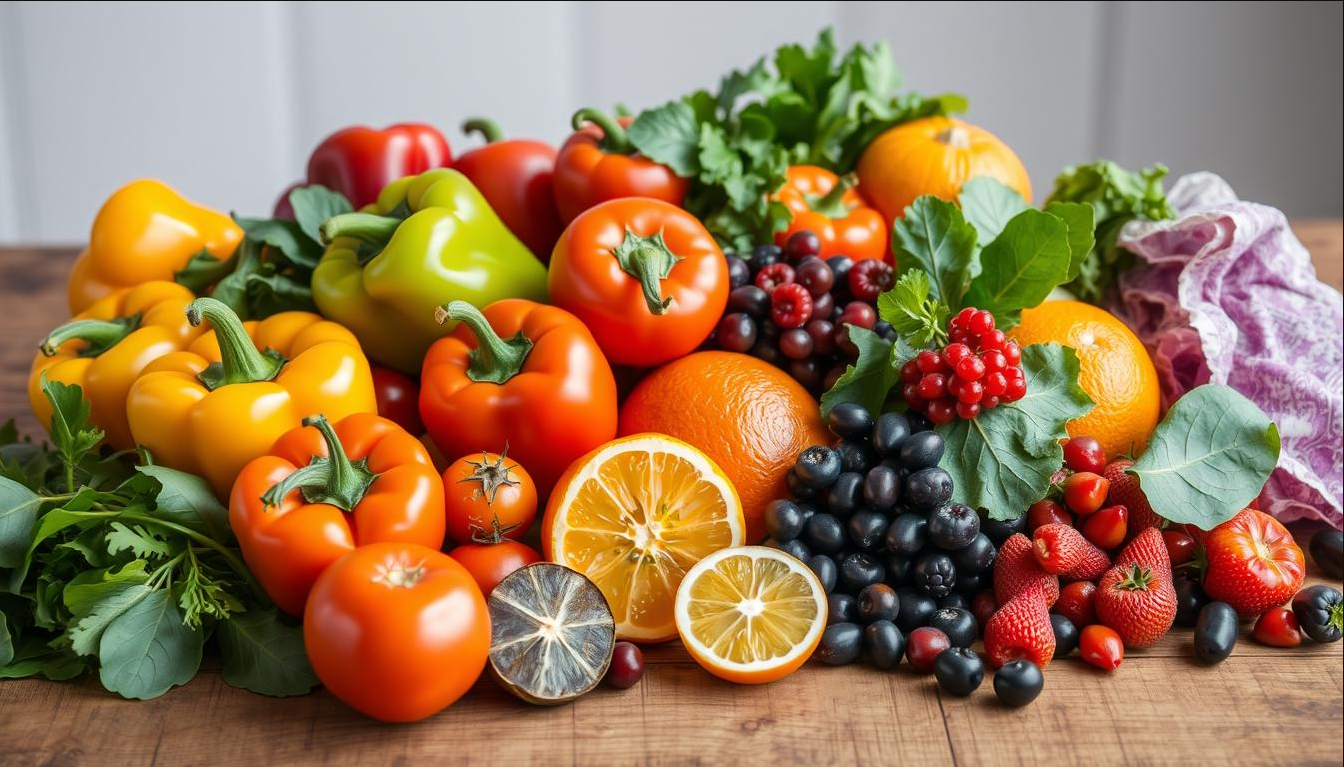Healthy Food For Everyday: Nourish Your Body Daily
Eating a variety of nutritious foods is key to good health. This includes fruits, vegetables, nuts, seeds, and lean proteins. Many foods are both healthy and tasty.
By choosing fruits, vegetables, quality proteins, and whole foods, your meals will be colorful and nutritious. This article will show you 50 healthy and delicious foods to add to your diet. These foods will help nourish your body every day.
Key Takeaways
- Eating a balanced diet with a variety of nutrient-dense foods supports overall health and wellbeing.
- Many common foods like fruits, vegetables, nuts, seeds, and lean proteins offer a wealth of essential vitamins, minerals, and other beneficial compounds.
- Incorporating a range of wholesome, minimally processed ingredients into meals and snacks can help you meet your nutritional needs.
- Meal planning and preparation strategies make it easier to prioritize healthy eating on a daily basis.
- A healthy lifestyle that emphasizes nutritious foods can contribute to weight management, disease prevention, and improved energy levels.
The Importance of Eating Healthy Foods
The Benefits of a Balanced Diet
Eating a balanced diet is key for good health. It supports the immune system and keeps skin and hair healthy. It also helps control blood sugar and lowers the risk of diseases like heart disease and cancer.
The World Health Organization (WHO) says a healthy diet fights chronic diseases. Eating lots of fruits and veggies lowers the risk of obesity and heart disease. Using healthy oils instead of saturated fats also helps prevent heart disease and stroke.
A diet that follows guidelines can boost energy and improve digestion. The Centers for Disease Control and Prevention (CDC) note heart disease is a big killer in the U.S. Healthy eating and exercise can prevent most heart disease and stroke.
“Maintaining a moderate weight reduces the risk of developing cancer and results in better outcomes.”
Dietary fiber is vital for a balanced diet. It improves blood cholesterol and lowers heart disease risk. It also helps with weight management and type 2 diabetes.
By eating well and adopting healthy habits, you get many benefits. A healthy lifestyle begins with eating the right foods.
Healthy Food For Everyday: Nutritious Meal Ideas
Fruits and Vegetables
Fruits and vegetables are packed with vitamins, minerals, and antioxidants. They are key to a healthy diet. Adding them to your meals can boost your health.
Apples, avocados, bananas, blueberries, oranges, and strawberries are great fruits. They’re full of nutrients and can be used in salads, smoothies, and as snacks. Vegetables like asparagus, bell peppers, broccoli, and carrots are also good. They can be roasted, sautéed, or added to soups and stir-fries.
Leafy greens like kale and spinach are very nutritious. They’re full of vitamins A, C, and K, and fiber. Adding them to omelets, sandwiches, and pasta dishes can make your meals healthier.
| Fruit or Vegetable | Key Nutrients | Health Benefits |
|---|---|---|
| Avocado | Healthy fats, fiber, vitamins, and minerals | Supports heart health, aids nutrient absorption, and promotes feelings of fullness |
| Blueberries | Antioxidants, vitamins, and fiber | May improve brain function, reduce inflammation, and support a healthy immune system |
| Broccoli | Vitamins, minerals, and sulforaphane | May help protect against certain types of cancer and support detoxification processes |
| Tomatoes | Lycopene, vitamin C, and potassium | May reduce the risk of heart disease and certain types of cancer |
Adding a variety of fruits and vegetables to your meals makes them nutritious and tasty. This supports your health and well-being.
“Eating a diet rich in fruits and vegetables can reduce the risk of many leading causes of illness and death.” – Harvard School of Public Health
Lean Protein Sources
Adding lean protein to your diet is key for keeping muscles strong and supporting your body. These foods help build and repair tissues. They also keep you full and give you energy all day.
Lean meat like chicken breasts, lean beef, and lamb are great choices. They are low in fat and high in protein. This makes them perfect for building muscle and managing weight.
Fish and seafood are also excellent options. Fatty fish like salmon, sardines, and tuna are full of omega-3s and protein. Shrimp is another seafood choice that’s low in fat but high in protein.
If you follow a plant-based diet, there are many lean protein choices. Legumes, nuts, seeds, and soy-based foods like tofu and edamame are all good. They add important nutrients to your diet.
| Protein Source | Protein (g) | Calories | Saturated Fat (g) | Total Fat (g) |
|---|---|---|---|---|
| Chicken Breast (4 oz) | 36 | 160 | 1 | 2.5 |
| Lean Ground Beef (3 oz) | 22.3 | 164 | 3.1 | 7.6 |
| Salmon (3 oz) | 16.8 | 121 | 0.8 | 5.4 |
| Tofu (1/2 cup) | 21.8 | 181 | 1.6 | 11 |
| Eggs (1 large) | 6.2 | 73.9 | 1.6 | 5 |
By mixing different lean protein sources into your meals and snacks, you meet your daily protein needs. This supports your health and wellness.
Whole Grains and Healthy Fats
Adding whole grains and healthy fats to your diet can boost your health. Whole grains like brown rice, oats, quinoa, and whole wheat bread are full of complex carbs, fiber, and vitamins. They help with digestion, keep blood sugar stable, and make you feel full.
Healthy fats in foods like avocados, nuts, seeds, and fatty fish are key for brain and skin health. They also lower bad cholesterol and increase good cholesterol. Monounsaturated fats and omega-3s are especially good for this.
The Dietary Guidelines suggest eating at least half whole grains. But, most Americans don’t get enough. To eat more whole grains, use whole-grain bread, pasta, and tortillas. Try brown rice or barley instead of refined grains, and add whole grains to meat dishes.
To get more healthy fats, use avocado oil for cooking. Sprinkle nuts and seeds on salads or yogurt. Also, include fatty fish like salmon or tuna in your meals. These small changes can give your body the nutrients it needs.
“Whole grains are a powerhouse of nutrients, providing fiber, vitamins, and minerals that can support overall health and well-being.”
Meal Planning and Preparation Tips
Adding healthy foods to your daily meals is easier with good planning and prep. Spend a bit of time upfront. Then, enjoy nutritious, homemade meals all week.
Meal Prepping Strategies
Meal prepping is a big help for a healthy lifestyle. Here are some tips:
- Plan your meals ahead and make a grocery list. This ensures you have what you need.
- Batch cook items like grains, proteins, and roasted veggies for the week.
- Chop and store fresh veggies like carrots, bell peppers, and spinach for easy meals.
- Make salads or overnight oats in containers for quick meals.
- Use airtight containers and freeze to keep your healthy foods fresh longer.
These meal-prepping strategies make it easier to eat healthy, homemade meals.
| Food Item | Refrigerator (40°F or lower) | Freezer (0°F or lower) |
|---|---|---|
| Cooked ground poultry or ground beef | 1-2 days | 3-6 months |
| Cooked whole meats, fish, and poultry | 3-4 days | 3-6 months |
| Cooked beans | 5 days | 2-3 months |
| Hard-boiled eggs | 1 week | N/A |
| Soft cheese, opened | 2 weeks | N/A |
| Hard cheese, opened | 5-6 weeks | N/A |
Plan your meals, prep ingredients early, and store food right. This makes it easy to eat healthy, homemade meals.
Conclusion
Eating a variety of nutrient-dense foods is key to nourishing your body. Foods like fruits, vegetables, lean proteins, whole grains, and healthy fats are essential. They help improve your energy, digestion, and lower disease risk.
Meal planning and preparation can also help. It makes sticking to a healthy diet easier. Remember, a healthy lifestyle is a journey. Small, sustainable changes can help you reach your goals and feel great.
By focusing on healthy eating and a balanced diet, you can boost your nutrition and overall health. A holistic approach to your diet and lifestyle empowers you to make better choices. This leads to a more vibrant, energetic life.
FAQ
What are the key benefits of eating a balanced diet?
A balanced diet offers many benefits. It boosts your immune system and keeps your skin and hair healthy. It also helps control blood sugar and lowers the risk of diseases like heart disease and diabetes.
What are some examples of healthy fruits and vegetables to include in my diet?
Healthy fruits include apples, avocados, bananas, blueberries, oranges, and strawberries. For vegetables, try asparagus, bell peppers, broccoli, carrots, cauliflower, cucumbers, garlic, kale, onions, and tomatoes.
What are some lean protein sources that are good for my health?
Lean proteins like chicken breasts, lean beef, and lamb are great for your health. Fish and seafood, such as salmon and shrimp, are rich in omega-3s. Plant-based options include legumes, nuts, seeds, and soy products like tofu.
Why are whole grains and healthy fats important in a balanced diet?
Whole grains like brown rice and quinoa offer complex carbs, fiber, and vitamins. They aid digestion and blood sugar control. Healthy fats in avocados and nuts support brain and skin health, and heart health.
How can meal planning and preparation strategies help me maintain a healthy diet?
Meal planning and prep can make healthy eating easier. Create a grocery list, cook in batches, and use airtight containers. These methods save time, ensure healthy options, and keep food fresh longer.

